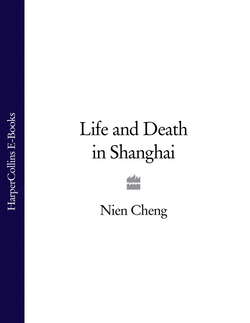Life and Death in Shanghai

Реклама. ООО «ЛитРес», ИНН: 7719571260.
Оглавление
Nien Cheng. Life and Death in Shanghai
Life and Death in Shanghai. Nien Cheng
Copyright
Table of Contents
CHAPTER 1 Witch-hunt
CHAPTER 2 Interval before the Storm
CHAPTER 3 The Red Guards
CHAPTER 4 House Arrest
CHAPTER 5 Solitary Confinement
CHAPTER 6 Interrogation
CHAPTER 7 The January Revolution and Military Control
CHAPTER 8 Party Factions
CHAPTER 9 Persecution Continued
CHAPTER 10 My Brother’s Confession
CHAPTER 11 A Kind of Torture
CHAPTER 12 Release
CHAPTER 13 Where Is Meiping?
CHAPTER 14 The Search for the Truth
CHAPTER 15 A Student Who Was Different
CHAPTER 16 The Death of Mao
CHAPTER 17 Rehabilitation
CHAPTER 18 Farewell to Shanghai
Epilogue
Index
About the Publisher
Отрывок из книги
To Meiping
Title Page
.....
After the Communist Army took over Shanghai, women were encouraged to take jobs. Winnie became a teacher at the Medical College in 1950. In the following year, Mao Tze-tung, anxious to put all universities under Party control, initiated the Thought Reform Movement. Winnie and Henry had their first rude awakening. Although they both survived this campaign more or less unscathed, they suffered the humiliating experience of having to make self-criticism of their family background, their education abroad and their outlook on life as reflected in the architectural designs Henry made and in their teaching methods. Repeatedly they had to write their life histories critically; each time, the Party representative demanded a more self-searching effort. At the end of their gruelling and humiliating experience, Henry was judged unfit to continue as Dean of the architectural department, which was now to use exclusively Soviet materials for teaching. Both Chinese traditional work and architectural designs from the West were scorned as feudalistic and decadent.
After the Thought Reform Movement was concluded in 1951, Party Secretaries were appointed to every level of university administration. They controlled every aspect of the life and work of the teaching staff, even though the majority of them had little education and had never been teachers. Henry and Winnie lived in premises assigned to them, accepted the salary given to them, did their work in the way the Party Secretaries wanted. These two well-educated, lively and imaginative young people, full of good will towards the Communist regime, were reduced by Mao Tze-tung’s suspicion and abuse of the intellectuals to teaching machines. But they were the fortunate ones. Many others from universities all over China did not fare as well. Some were sent to labour camps while others were thrown out of the universities altogether.
.....